Quitting
Struggling at work
If you’re struggling to succeed at work and are constantly getting feedback about the ways that you are underperforming, it doesn’t mean that you’re incompetent. It could mean:
- Your workload or deadlines are unrealistic
- Your manager has different priorities or expectations for the job than you do
- There is a gap between your skills and the job requirements
These issues are solvable. Workloads and deadlines are negotiable. Priorities can be discussed and agreed upon. Training or mentoring can be provided to raise skill levels.
If your manager is unwilling to discuss and implement changes that would improve your performance, then the job is a bad fit. It doesn’t mean you’re a bad worker if you don’t have the characteristics needed for a particular job. It just means that it isn’t the right job for you.
Everyone at Deadspin quit
By November 1, 2019, every writer and editor at Deadspin had quit.
If you haven’t heard the backstory, it reads like fiction: the Gawker Media website published a sex tape involving Hulk Hogan, who then partnered with billionaire Peter Thiel to sue the site (Thiel held a grudge against Gawker for outing him). Upon winning the suit, Gawker was forced into bankruptcy and Deadspin, one of its blog-sites that covered sports, was sold to Univision Communications, who later sold to a private-equity firm that created a new company called G/O Media Inc.
G/O Media’s owners and management team did not integrate well with the existing staff. There were accusations of gender discrimination and writers and editors were baffled by their leader’s demands that weren’t in the best interest of readers or staff, or even the bottom line. When a beloved deputy editor was fired, the entire staff quit in protest.
I was shocked. Perhaps belonging to the GMG Union provided sufficient solidarity to band together. It’s much more common for peers in a toxic work environment to quit one-by-one, in a slow trickle, when each person either finally finds a new job or hits the limit of what they are willing to accept.
If you’re dealing with your own toxic workplace, don’t expect your peers to stand with you to the end. When people feel like their jobs are in jeopardy, they are more likely to focus on self-preservation. Instead, focus on making the best choices you can. For some, that might mean quitting as soon as their integrity is challenged. For others, it might mean putting their family’s need to stay housed and fed first – and then finding a better job.
Know when to go
A common mistake among people who quit their jobs is that they wait too long to do it. When things start going badly, it’s natural to ignore it at first, and then take a wait-and-see approach, hoping it will get better. If it doesn’t, you might find that your self-esteem erodes, your health suffers, and you start to doubt whether you can find a better job somewhere else.
It is especially difficult if you are in a specialized field, or if you live in a place with few other employers. You might feel trapped.
You’re probably not trapped.

Yes, quitting whenever you want is a privilege for those with wealth and opportunities. But if you’re earning an income, you can take steps to build up your bank account and create more choices for yourself. I wrote about this in more detail in my Savings = Options blog from 2014.
Beyond financial needs, the biggest blocker is often a person’s own mindset. It’s easy to get discouraged and lose sight of possibilities. When you’re in a negative work environment for an extended time period, you can develop a trauma-like response. Your mind starts filtering out the wider world because you’re in survival mode, focusing only on what’s in front of you.
It can be hard to pull yourself out of that state, but people do it every day. Just knowing that fear distorts perception is a start. Don’t believe everything you think about yourself.
Ask people you trust if you have an accurate belief in your employability. I was once asked by a very clever person who had a solid track record in his day job and a successful side hustle if I thought that other companies would want to hire him. Yes! Definitely!
Another thing that people do when they’re struggling with a bad job is to find reasons not to pursue new ones. People invent justifications before investigating whether their assumptions are true or not.
“That company’s office is too far away, and I hate to commute.” Maybe. But maybe they would let you work at home part of the time, or if it is a tech giant, maybe they have a free corporate shuttle with Wi-Fi. Or your work schedule would let you miss the worst of heavy traffic. You won’t know if you don’t pursue the role in the first place.
Dying trees and new jobs
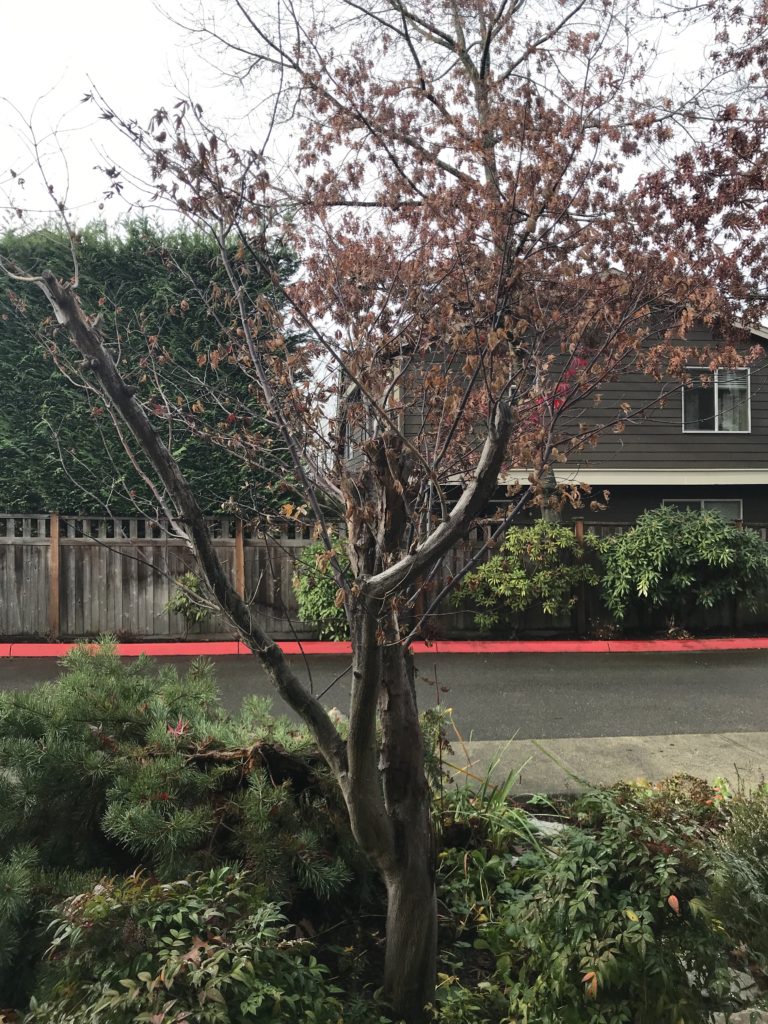
I’d hoped the tree would recover but after two years of stunted growth and increasingly bare limbs, I had to face that this wasn’t going to happen. A fungus got in the soil and the 16-year-old Japanese maple was too weakened to heal. It was sad; I had watched that red-leafed maple grow from 6 feet all the way up to the top of my second story window. I wanted to give it a chance.
I finally accepted that to have a healthy tree that will live a long time and grow to a full height, the diseased tree would have to be removed. Even part of the roots, to make room for the new planting.
I wanted to replace it with an identical tree that matched my neighbors’, but that would leave the new tree susceptible to the same infection. Instead, the arborist recommended a different species that is immune to the fungus.
I had invested a lot of time in caring for the tree and it was familiar and important to me. In the last few years it was finally tall enough to offer some shade on the hot, western side of my home. A new planting would be expensive, especially one that was partially grown. Although I had good reasons to keep my tree, or at least a replica of it, it wasn’t the smartest choice.
This is a great metaphor for a job that is no longer right for you. Just as I was invested in my tree and the shade it provided, you might be deeply enmeshed in your current role and have valid reasons why you want to stay, even though parts of your job are “diseased.”
And just as I knew that a replacement would have costs, including years of growing tall enough to provide protection from the sun, a new job often means losing some benefits and requires time to develop credibility and goodwill with new coworkers and managers.
Thinking about what you’ll give up and the risks of making a change can be paralyzing. But if I had replaced the maple when it first showed signs of damage, I would be much closer to having the shade I want for my window and balcony. Waiting didn’t change the inevitable outcome…it just raised the price of the tree with inflation and lengthened the time I’ll have to wait for it to grow tall.
If you are unhappy in your job but delay getting a new one, how much more will your confidence and stress levels continue to suffer? Bad jobs drain energy and wellbeing. It’s easier to look for a job and convince interviewers to hire you when you’re mentally and physically strong.
Back in November, I finally had the tree replaced. The new planting was about 6 feet tall but thin and bare-branched. I had a bag around the trunk to fill with water during dry weather and nurtured the heck out of that tree. It paid off. The over-wintering allowed roots to get established and by the time it started leafing, it had already grown more than a foot taller.
And then, because life is like that: PLOT TWIST!
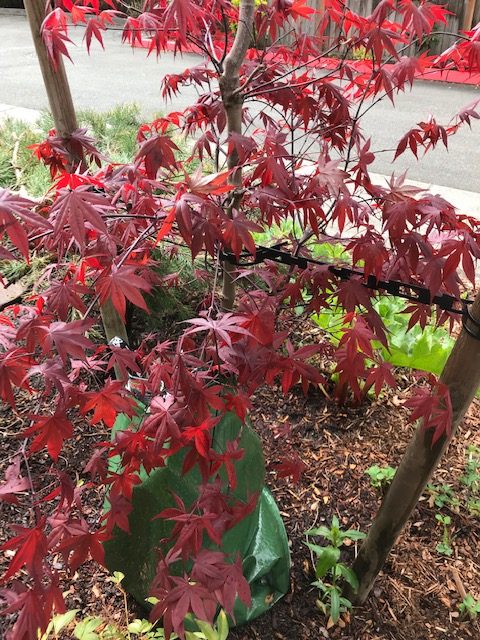
As the leaves started to develop in April, I kept remarking to my neighbors that even though it was a different species, it looked very similar to the other Japanese maples. After the third time I said this, it dawned on me that they had planted the wrong tree.
The arborist had provided two quotes back in November. One was for an “Acer Palmatum Blood Good” – a Japanese maple varietal and the other was for a Stewartia Pseudocamelia. I ordered the Stewartia but they planted the maple.
At this point, I was attached to this little tree that had been growing for months and reluctant to start over. After multiple conversations with the arborist, I agreed that the best long-term choice was to replace the maple with the Stewartia because it isn’t susceptible to the fungus in the soil. But when the day came, they called me from the nursery to double check that the green-leaved Stewartia was what I wanted.
Uh…it had been over 7 months since I first met with the arborist, but I remember seeing a picture of a red-leafed tree. On the phone, they said that the tree turns red in autumn, but is green the rest of the year.
That was enough for me to say no to the replacement.
My new tree was already established, thriving and matched the neighborhood trees. I know there’s a risk that if the limbs suffer damage, it won’t be able to fight off the fungus and I will have to replace it. It is not an ideal environment for its longevity. But right now, the young maple is healthy and beautiful, and I want to keep it. If in later years it becomes diseased, I will immediately have it replaced – with as large of a tree as possible to more quickly reach the height I want.
This is another metaphor for changing jobs. You go into a new role with expectations based on your research and what you’ve been told, but sometimes the reality is different. Your day-to-day tasks aren’t what you thought they would be. The manager who hired you leaves, and now you must get to know their successor. The organization’s priorities change, and you are asked to cancel a project or take on a new set of responsibilities.
If you end up disliking your new job, you don’t have to suffer through it. You can attempt to negotiate with your management to improve what isn’t working, especially the parts that are different from the job description you agreed to. If that doesn’t work, you can start the job search again. Just because it’s a new role doesn’t mean you are stuck with it.
Maybe, though, once the surprise has worn off after finding your new role isn’t what you anticipated, you’ll realize that it’s fine. All changes come with risk. Calculated risks are better than steadily declining in a diseased environment.
Your next job doesn’t have to be your forever job

If you feel stuck in a bad job it can be easy to lose sight of the bigger picture. You’re probably stressed, frustrated and tired. Your work conditions and how you feel can make it difficult to spend energy on anything but coping.
Wouldn’t it be nice if a letter came down your chimney containing a job offer that is perfectly suited to your interests and abilities and paid enough money that you didn’t have to worry about bills, like Harry Potter’s invitation to go to school at Hogwarts?
Many of us would be thrilled just to know what type of job would make us happy so we could start pursuing it. But if you’re depleted from your current job, you’re not in an ideal frame of mind to think of realistic possibilities. It is easier to dream about a job that you think you would love and ignore the part about needing to make a living wage and have healthcare benefits.
You don’t have to stay in your miserable job until you figure out what type of work is best for you. Your best course of action might be to just start looking for similar work somewhere else. Take your existing skills and experience and apply for jobs you’re qualified for.
Getting hired by a new employer may provide a boost of confidence along with a new setting and new coworkers. It’s a change that could give you a fresh perspective about what you like and don’t like about the work you’re doing. These insights will help you consider what it would take to have a job that makes you happy.
Your next job doesn’t have to be the perfect job that you want to stay in until you retire. It can be the next job on your journey to a fulfilling career.
Leaving the Good with the Bad
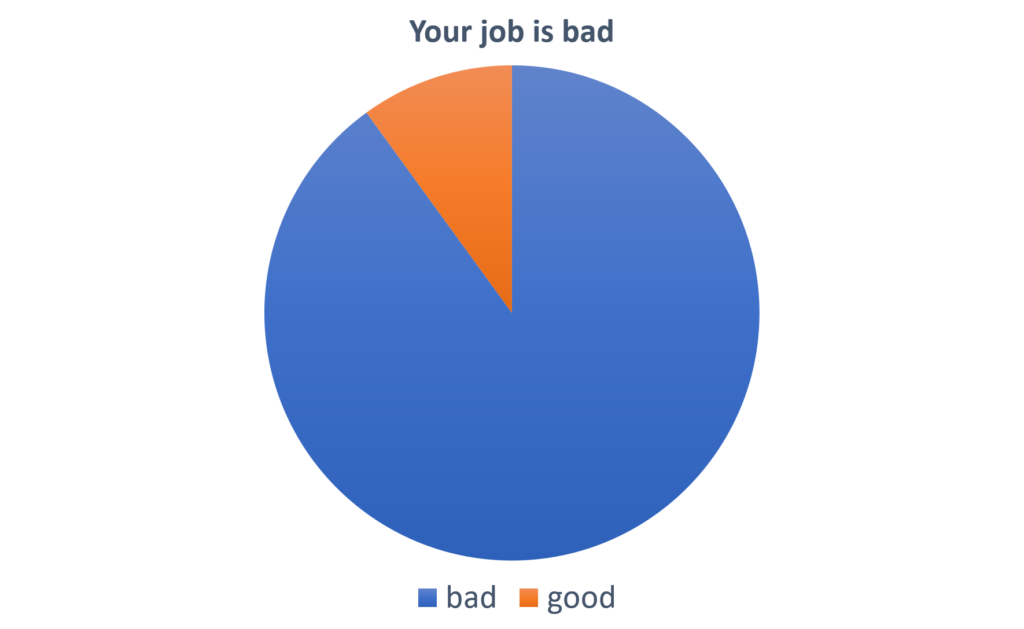 Rarely are bad jobs all bad. You might have an easy commute, nice work friends and decent wages mixed in with a nasty boss and brutal hours. One of the toughest hurdles to overcome when you are making up your mind to quit your job is accepting the loss of the good parts you will leave behind.
Rarely are bad jobs all bad. You might have an easy commute, nice work friends and decent wages mixed in with a nasty boss and brutal hours. One of the toughest hurdles to overcome when you are making up your mind to quit your job is accepting the loss of the good parts you will leave behind.
It is normal to cling to the positive parts within a bad situation. It has a purpose: it keeps you stuck in the decision-making phase, which is uncomfortable but not as scary as walking away from a significant aspect of your life and facing the uncertainties in your future.
It is also tempting to overemphasize the positive while downplaying the negative. But if you dread going to work and can’t shake off the stress when you’re done for the day, your job is bad for you. Even if you love the project you’re working on and got a raise last month, if your job makes you unhappy – it’s bad.
It’s ok to grieve your losses and be nervous about whether you’ll enjoy your next work position. Giving up something you care about isn’t easy. Deciding to let go of the good in order to be free from the bad is brave – and worth it.
Tiny Decisions
 When you feel stuck in a bad job, it can seem like there’s no good solution. The obvious choices are often weighty ones that have a big impact on your life.
When you feel stuck in a bad job, it can seem like there’s no good solution. The obvious choices are often weighty ones that have a big impact on your life.
Quit? Try a different career? Move to a new city?
A new job can change your hours, commute, paycheck, the type of people you spend your day with – in addition to changing what you actually do at work. It can be overwhelming to think about all the ways your life will be altered – and tempting to do nothing to avoid the risk of making the wrong decision.
But doing nothing keeps you feeling stuck.
You don’t have to make all-or-nothing decisions.
Making one tiny decision at a time reduces pressure and could ultimately create a better outcome. Each tiny decision has low stakes, so it doesn’t matter if you don’t like the results of any particular choice. Whether you like the results or not, you’ve got the feedback you need to help you make the next tiny decision.
For example, a common tiny decision would be looking at job postings for a company you think you’d enjoy working for. If you like what you read, the next tiny decision might be looking up employee reviews on Glassdoor. Or finding people who’ve worked there and ask them about their experience.
If at any point you don’t like what you’ve learned, you can stop going down that path and try a completely different tiny decision. Like taking a free online course in a subject that interests you. If you dislike it – quit. Then try something else. Maybe you are still interested in the topic, but reading articles about it will be a better fit than taking an online course.
Here’s an analogy for the difference between making one giant decision or a series of tiny decisions: A giant decision is like leaping from the starting point of a race to the finish line. Tiny decisions are like taking one step at a time, choosing where to put each footstep. The first way gets you there faster, and if you are confident that you’ll like the result – great. But if you’re unsure, smaller steps let you change direction more easily, while still propelling you forward.
Losing Perspective and Getting it Back
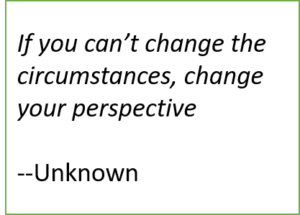 When we’re in the middle of challenging circumstances at work, it is easy to lose perspective.
When we’re in the middle of challenging circumstances at work, it is easy to lose perspective.
Under significant stress, we get tunnel vision. When our adrenal glands activate our flight or fight response, we narrow our focus to better deal with the threat at hand.
That’s great when we’re faced with immediate bodily harm. It’s not helpful when our bodies feel threatened every time we go to work.
When our attention is tightly focused on the stressful problem we’re experiencing, our ability to come up with solutions is reduced. Our brains draw on what we’ve already learned and experienced.
For example, maybe every time your previous manager yelled at you about a project you could calm them down by saying “Yes, I’ll get right to it”. Now your brain might be stuck on finding similar solutions, even if that approach doesn’t work at all with your current boss.
When you’re on high alert at work from constant stress, your natural flight or fight response is probably not going to help you deal with your manager, either. When they berate and demean you in front of your colleagues, you might feel an urge to throw a punch or to run out of the building. If you’re in control of your behavior, you’re most likely to freeze instead.
Many of us have felt stuck in a bad job. When we’re in a toxic workplace for a long time, our narrowed perspective can seem like our only reality. It might seem like there aren’t any good solutions. For every idea, we think of reasons why it won’t work. At times like this our best moments are when we’re distracted from thinking about our jobs.
How do we get perspective back once it’s lost?
The best advice I’ve learned is from the book Good to Great, by Jim Collins. In chapter four, Collins interviewed retired Vice Admiral Jim Stockdale, who survived nearly eight years as a prisoner of war in Vietnam. As he described his survival, Stockdale said, “You must never confuse faith that you will prevail in the end—which you can never afford to lose—with the discipline to confront the most brutal facts of your current reality, whatever they might be.”
Stockdale had an unwavering belief that he would get out of captivity without ignoring the horrific situation he was in. He not only survived, but went on to complete his military career, work in academia, and write a book.
Having faith that you will prevail over your current work circumstances can be challenging when you feel like you’re in survival mode. But think of Stockdale. He was literally in survival mode and prevailed.
Can you believe that you will go on to a better job and leave your miserable one behind? I have talked to over a hundred people who have done this. They were call center employees, pizza deliverers, paralegals, tech workers, correction officers, teachers, government employees, among others.
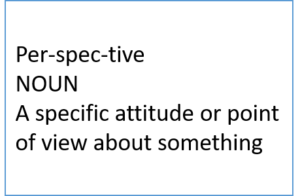 In my own career, I once felt trapped in a stressful job where I felt miserable most of the time. I believed that I could quit and find a different job, but I kept thinking of reasons not to. I worried that a new job would have worse benefits, or that I’d have a long commute, or that maybe the good parts of my job should outweigh the bad. I worried about the unknown.
In my own career, I once felt trapped in a stressful job where I felt miserable most of the time. I believed that I could quit and find a different job, but I kept thinking of reasons not to. I worried that a new job would have worse benefits, or that I’d have a long commute, or that maybe the good parts of my job should outweigh the bad. I worried about the unknown.
I had to convince myself to accept “the brutal facts of my current reality”. This meant accepting that there were positive parts of my job that I would miss: a project that I loved working on, many coworkers, and the salary and benefits. I also accepted that the job was wrong for me and I needed to leave it.
It took a long time for me to reach that point, but once I did, my perspective changed in an instant. At the time, I was home sick and didn’t have the energy to do much other than rest. I remember reclining on my couch, staring at the walls of my home, my sanctuary. I suddenly realized that a big reason why I stayed in my job was that it paid the mortgage and other bills.
In that moment, the trap was broken. I knew I could find other work that paid my living expenses, and that staying at my job wasn’t worth the negative impact it had on my wellbeing.
From that moment on, ideas for work came to me without trying. My mind opened to new options, I started writing again, and stopped worrying about paying the mortgage. I was confident in the many positive possibilities that my future could hold.
That was many years and mortgage payments ago. Since then I have been on a whirlwind of adventures in business and writing that I could not have imagined when I was clawing at solutions from inside a small, weary point of view.

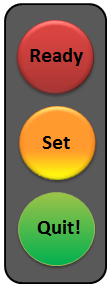 I was stuck in stop-and-go traffic for almost hour this evening. I would rather have been home already, or at least driving at a steady speed, but wasn’t really annoyed. I was on the fastest route and there was nothing I could do to make traffic move more quickly.
I was stuck in stop-and-go traffic for almost hour this evening. I would rather have been home already, or at least driving at a steady speed, but wasn’t really annoyed. I was on the fastest route and there was nothing I could do to make traffic move more quickly.
Recent Comments